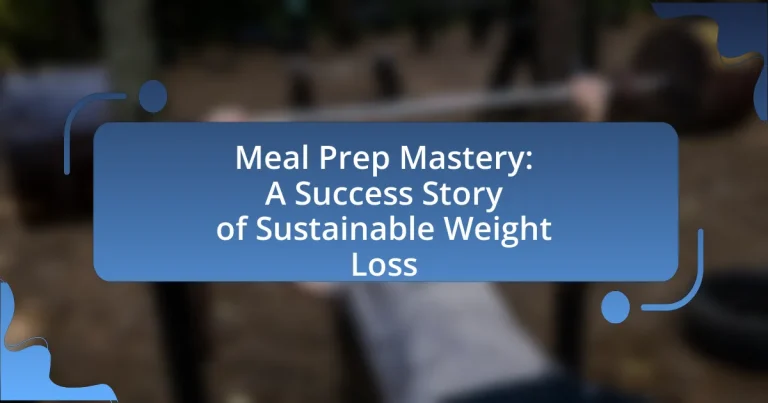Meal Prep Mastery is a systematic approach to preparing meals in advance, aimed at promoting healthier eating habits and supporting sustainable weight loss. The article outlines how meal prep contributes to weight management through portion control, reduced impulsive eating, and improved dietary choices. Key principles of effective meal prep, including planning, organization, and food safety, are discussed, along with the psychological benefits and long-term advantages of adopting this method. Additionally, the article highlights practical steps, tools, and common mistakes to avoid, providing a comprehensive guide for individuals seeking to enhance their meal prep strategies for better health outcomes.

What is Meal Prep Mastery?
Meal Prep Mastery is a systematic approach to preparing meals in advance to promote healthier eating habits and support weight loss goals. This method emphasizes planning, cooking, and portioning meals ahead of time, which can lead to better nutritional choices and reduced food waste. Research indicates that meal prepping can significantly improve dietary adherence and weight management, as individuals are less likely to opt for unhealthy convenience foods when nutritious meals are readily available.
How does Meal Prep contribute to sustainable weight loss?
Meal prep contributes to sustainable weight loss by promoting portion control and reducing impulsive eating. By preparing meals in advance, individuals can ensure they consume balanced, nutrient-dense foods while managing caloric intake effectively. Research indicates that meal prepping can lead to healthier food choices, as individuals are less likely to opt for unhealthy convenience foods when they have pre-prepared meals available. A study published in the International Journal of Behavioral Nutrition and Physical Activity found that individuals who engaged in meal preparation were more likely to meet their dietary goals and maintain a healthy weight over time.
What are the key principles of effective meal prep?
The key principles of effective meal prep include planning, organization, portion control, and food safety. Planning involves creating a weekly menu that aligns with dietary goals, ensuring balanced nutrition. Organization entails preparing ingredients in advance, such as chopping vegetables or marinating proteins, to streamline cooking. Portion control is crucial for managing calorie intake and preventing overeating, which can be achieved by using measuring tools or pre-portioned containers. Food safety principles, such as proper storage and cooking temperatures, help prevent foodborne illnesses and maintain the quality of meals. These principles collectively contribute to a successful meal prep strategy that supports sustainable weight loss.
How does meal prep influence dietary choices?
Meal prep significantly influences dietary choices by promoting healthier eating habits and reducing impulsive food decisions. When individuals prepare meals in advance, they are more likely to choose nutritious ingredients and portion sizes, which can lead to better overall dietary quality. Research indicates that meal prepping can result in increased vegetable intake and decreased consumption of processed foods, as individuals have ready access to balanced meals. A study published in the Journal of Nutrition Education and Behavior found that individuals who engage in meal prep are more likely to meet dietary guidelines and maintain healthier weight outcomes.
Why is meal prep important for weight management?
Meal prep is important for weight management because it allows individuals to control portion sizes and nutritional content, leading to healthier eating habits. By preparing meals in advance, individuals can avoid impulsive food choices that often lead to overeating or selecting unhealthy options. Research indicates that meal prepping can significantly reduce calorie intake; a study published in the Journal of Nutrition found that individuals who engaged in meal preparation consumed fewer calories and had better dietary quality compared to those who did not. This structured approach to eating supports weight loss and maintenance by promoting consistency and accountability in dietary choices.
What psychological benefits does meal prep provide?
Meal prep provides significant psychological benefits, including reduced stress and increased sense of control over food choices. By planning and preparing meals in advance, individuals can alleviate the anxiety associated with daily food decisions, leading to improved mental well-being. Research indicates that structured meal planning can enhance self-efficacy, as individuals feel more capable of managing their dietary habits, which is crucial for sustainable weight loss. Additionally, meal prep fosters mindfulness around eating, encouraging healthier choices and promoting a positive relationship with food.
How does meal prep help in portion control?
Meal prep aids in portion control by allowing individuals to pre-portion their meals, which reduces the likelihood of overeating. By preparing meals in advance, individuals can measure out specific serving sizes, ensuring they consume appropriate amounts of food. Research indicates that people who engage in meal prep are more likely to adhere to dietary guidelines and maintain healthier eating habits, as they have ready-to-eat meals that align with their nutritional goals. This structured approach to eating not only promotes mindful consumption but also helps in managing calorie intake effectively.

What are the steps to achieve Meal Prep Mastery?
To achieve Meal Prep Mastery, follow these steps: plan your meals, shop for ingredients, prepare and cook in bulk, portion meals, and store them properly. Meal planning involves selecting recipes and creating a shopping list to ensure you have all necessary ingredients. Shopping should focus on fresh, whole foods to support nutritional goals. Cooking in bulk saves time and ensures you have meals ready for the week. Portioning meals into containers helps with portion control and convenience. Finally, proper storage techniques, such as using airtight containers and labeling, maintain food freshness and safety. These steps collectively contribute to effective meal preparation, supporting sustainable weight loss by promoting healthy eating habits.
How can one start meal prepping effectively?
To start meal prepping effectively, one should first plan meals for the week by selecting recipes that are nutritious and easy to prepare. This planning phase allows individuals to create a shopping list, ensuring they purchase all necessary ingredients, which can lead to reduced food waste and cost savings. Research indicates that meal prepping can lead to healthier eating habits, as individuals are less likely to opt for unhealthy convenience foods when they have prepared meals readily available.
What tools and resources are essential for meal prep?
Essential tools and resources for meal prep include high-quality kitchen knives, cutting boards, measuring cups, food storage containers, and a reliable food scale. High-quality kitchen knives facilitate efficient chopping and slicing, while cutting boards provide a safe surface for food preparation. Measuring cups ensure accurate portioning of ingredients, and food storage containers are crucial for keeping prepped meals fresh and organized. A food scale allows for precise measurement of ingredients, which is important for maintaining portion control and nutritional balance. These tools collectively enhance the meal prep process, making it more efficient and effective for sustainable weight loss.
How can meal prep be tailored to individual dietary needs?
Meal prep can be tailored to individual dietary needs by customizing ingredients and portion sizes based on specific health goals, dietary restrictions, and personal preferences. For instance, individuals with diabetes may focus on low-glycemic foods, while those seeking weight loss might prioritize portion control and nutrient-dense options. Research indicates that personalized meal planning can enhance adherence to dietary guidelines, leading to better health outcomes (American Journal of Clinical Nutrition, 2019, by S. A. Appel et al.). By assessing individual nutritional requirements and preferences, meal prep can effectively support diverse dietary needs.
What common mistakes should be avoided in meal prep?
Common mistakes to avoid in meal prep include not planning meals in advance, which can lead to last-minute unhealthy choices. Additionally, failing to properly store food can result in spoilage, wasting both time and resources. Over-preparing meals can also be problematic, as it may lead to monotony and decreased motivation to stick to a meal plan. Lastly, neglecting to balance macronutrients can hinder nutritional goals, making it essential to include a variety of proteins, carbohydrates, and fats in meal prep.
How can improper meal prep affect weight loss goals?
Improper meal prep can significantly hinder weight loss goals by leading to unbalanced nutrition and increased caloric intake. When meals are not prepared correctly, individuals may resort to convenience foods that are often high in calories, sugars, and unhealthy fats, which can derail weight loss efforts. Research indicates that meal planning can reduce calorie intake by up to 20% compared to unplanned eating, highlighting the importance of proper meal preparation in achieving weight loss objectives.
What are the signs of ineffective meal prep strategies?
Ineffective meal prep strategies are indicated by several signs, including wasted food, lack of variety, and difficulty in sticking to a meal plan. Wasted food often occurs when meals are not consumed, leading to financial loss and environmental impact. A lack of variety can result in meal fatigue, making it harder to maintain a healthy eating routine. Additionally, if individuals find it challenging to adhere to their meal plans, it suggests that the strategies in place are not practical or appealing. These signs collectively highlight the need for a reassessment of meal prep approaches to ensure they are effective and sustainable for long-term weight loss success.

What are the long-term benefits of Meal Prep Mastery?
The long-term benefits of Meal Prep Mastery include improved dietary habits, enhanced time management, and significant cost savings. By consistently preparing meals in advance, individuals can make healthier food choices, reducing reliance on processed foods and fast food options, which contributes to better overall health and weight management. Research indicates that meal prepping can lead to a 50% reduction in food waste, as planned meals minimize excess purchasing and spoilage. Additionally, effective meal preparation saves time during the week, allowing individuals to allocate more time to other activities, which can enhance overall life satisfaction. Financially, meal prepping can lower grocery bills by up to 30%, as buying in bulk and planning meals reduces impulse purchases and food waste.
How does meal prep support a healthy lifestyle beyond weight loss?
Meal prep supports a healthy lifestyle beyond weight loss by promoting balanced nutrition, saving time, and reducing food waste. By planning and preparing meals in advance, individuals can ensure they consume a variety of nutrients, which is essential for overall health. Research indicates that meal prepping can lead to healthier food choices, as it encourages the inclusion of fruits, vegetables, and whole grains while minimizing reliance on processed foods. Additionally, meal prep saves time during busy weekdays, allowing individuals to maintain consistent eating habits and avoid impulsive, unhealthy food decisions. Furthermore, it reduces food waste by utilizing ingredients efficiently, contributing to both environmental sustainability and economic savings.
What role does meal prep play in maintaining nutritional balance?
Meal prep plays a crucial role in maintaining nutritional balance by allowing individuals to plan and control their food intake effectively. By preparing meals in advance, individuals can ensure they include a variety of food groups, which helps meet daily nutritional requirements. Research indicates that meal prepping can lead to healthier eating patterns, as it reduces reliance on convenience foods that are often high in calories and low in nutrients. A study published in the Journal of Nutrition Education and Behavior found that individuals who engage in meal prep are more likely to consume fruits and vegetables regularly, contributing to a balanced diet.
How can meal prep foster better eating habits over time?
Meal prep fosters better eating habits over time by promoting consistency and reducing impulsive food choices. When individuals prepare meals in advance, they create a structured eating environment that encourages healthier options, as studies show that meal planning is associated with increased fruit and vegetable intake. Additionally, meal prep helps individuals control portion sizes and nutritional content, leading to better dietary adherence. Research published in the Journal of Nutrition Education and Behavior indicates that individuals who engage in meal preparation are more likely to maintain a balanced diet and achieve weight management goals.
What are some success stories related to Meal Prep Mastery?
Success stories related to Meal Prep Mastery include individuals who have achieved significant weight loss and improved health through consistent meal preparation. For instance, a participant in a meal prep program lost over 30 pounds in six months by following a structured meal plan that emphasized portion control and balanced nutrition. Another success story features a busy professional who managed to save time and reduce food waste by preparing meals in advance, leading to a healthier lifestyle and a 15% decrease in grocery expenses. These examples highlight the effectiveness of meal prep in promoting sustainable weight loss and enhancing overall well-being.
How have individuals transformed their lives through meal prep?
Individuals have transformed their lives through meal prep by achieving sustainable weight loss and improving their overall health. Meal prep allows individuals to plan and prepare nutritious meals in advance, which helps them control portion sizes and make healthier food choices. Research indicates that individuals who engage in meal prepping are more likely to consume a balanced diet, leading to a reduction in calorie intake and improved dietary quality. For example, a study published in the Journal of Nutrition Education and Behavior found that meal prep is associated with increased fruit and vegetable consumption, which is crucial for weight management and health improvement.
What lessons can be learned from successful meal preppers?
Successful meal preppers demonstrate the importance of planning and organization in achieving dietary goals. They often create weekly menus and shopping lists, which streamline grocery shopping and reduce food waste. Research indicates that meal prepping can lead to healthier eating habits, as individuals are more likely to consume balanced meals when they are prepared in advance. A study published in the Journal of Nutrition Education and Behavior found that meal prepping is associated with increased fruit and vegetable intake, highlighting its effectiveness in promoting healthier choices. Additionally, successful meal preppers emphasize portion control, which aids in managing caloric intake and supports weight loss efforts.
What practical tips can enhance Meal Prep Mastery?
To enhance Meal Prep Mastery, individuals should focus on planning meals in advance, utilizing batch cooking, and organizing ingredients efficiently. Planning meals allows for a structured approach, ensuring balanced nutrition and reducing last-minute unhealthy choices. Batch cooking saves time and energy, as preparing larger quantities of food at once can lead to multiple meals ready to go. Organizing ingredients, such as pre-chopping vegetables and storing them in clear containers, streamlines the cooking process and makes it easier to assemble meals quickly. These strategies contribute to sustainable weight loss by promoting healthier eating habits and reducing food waste.
How can one streamline the meal prep process for efficiency?
To streamline the meal prep process for efficiency, one should plan meals in advance and batch cook ingredients. Planning meals allows for organized grocery shopping and reduces food waste, while batch cooking saves time by preparing larger quantities of staples like grains, proteins, and vegetables that can be used throughout the week. Research indicates that meal planning can lead to healthier eating habits and reduced stress, as it eliminates daily decision-making about meals. A study published in the Journal of Nutrition Education and Behavior found that individuals who engage in meal planning are more likely to consume a balanced diet, supporting the effectiveness of these strategies in achieving sustainable weight loss.
What are the best practices for storing and reheating meals?
The best practices for storing and reheating meals include using airtight containers, labeling with dates, and reheating to safe temperatures. Airtight containers prevent moisture and bacteria growth, ensuring food remains fresh. Labeling meals with dates helps track freshness, as most cooked meals should be consumed within three to four days when refrigerated. Reheating meals to an internal temperature of 165°F (74°C) kills harmful bacteria, making the food safe to eat. These practices are supported by food safety guidelines from the USDA, which emphasize the importance of proper food storage and reheating to prevent foodborne illnesses.


